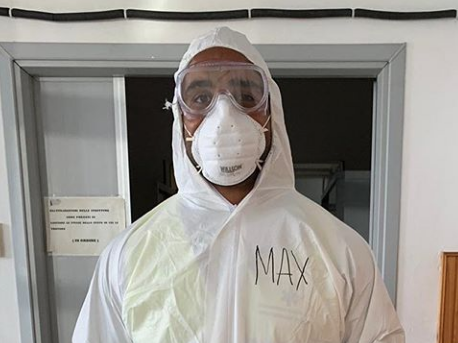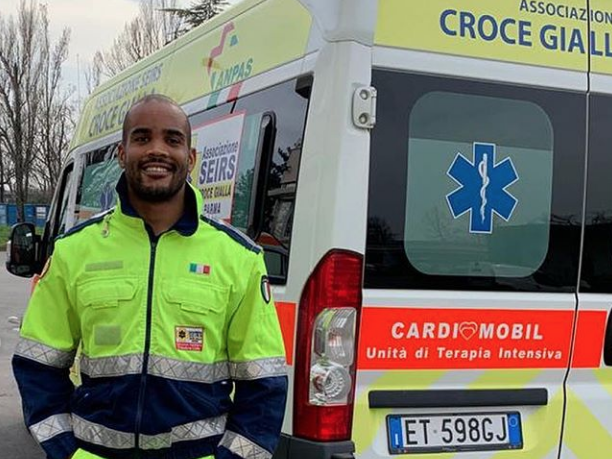Italy flanker Maxime Mbanda fights fear to persist as volunteer in battle to beat coronavirus
The 27-year-old has driving ambulances carrying coronavirus patients to and from hospitals

Your support helps us to tell the story
From reproductive rights to climate change to Big Tech, The Independent is on the ground when the story is developing. Whether it's investigating the financials of Elon Musk's pro-Trump PAC or producing our latest documentary, 'The A Word', which shines a light on the American women fighting for reproductive rights, we know how important it is to parse out the facts from the messaging.
At such a critical moment in US history, we need reporters on the ground. Your donation allows us to keep sending journalists to speak to both sides of the story.
The Independent is trusted by Americans across the entire political spectrum. And unlike many other quality news outlets, we choose not to lock Americans out of our reporting and analysis with paywalls. We believe quality journalism should be available to everyone, paid for by those who can afford it.
Your support makes all the difference.Italy flanker Maxime Mbanda has vowed to push through the fear and keep driving ambulances carrying coronavirus patients to and from hospital.
The Zebre back-row forward is volunteering for Italy’s Yellow Cross charity, driving Covid-19 patients to hospital in emergencies, or transferring patients from one medical centre to another.
The 27-year-old admitted he does fear for his own health, but has pledged to keep on volunteering for the duration of the pandemic.
Wearing protective clothing from head to foot, Mbanda admitted patients desperately gasping for breath can only communicate their fears through their eyes.
“I can tell you that I’m scared, because every time you step into an infected department in the hospital you know that the enemy is in the air, it’s on everything you can touch,” Mbanda told the PA news agency. The enemy is invisible; you can’t see it.

“But I know I’m doing a good thing, in my little work, because with all respect to doctors and nurses my work is very little, but I’m trying to help as many people as possible.
“So I’ll keep on going until this emergency is over.
“It’s difficult but I’m trying to do my best. I don’t have a medicine degree or a nurse’s degree, but I’m trying to do my best.
“I’m helping transfer patients between hospitals, to help nurses to create space.
“The patients are scared, even when you transfer them from one hospital to another. Even if they don’t speak because they have oxygen masks on, with their eyes they can talk to you. They can tell you that they are scared with their eyes.
“You have to try to take care of them like you would for parents or family. You have to hold their hand. The worst fact is after every time you touch them you have to sanitise your hands, because you know they are Covid-19 positive.
“It takes us 10 minutes to get dressed in all our protective equipment.
“I’m healthy now, and as long as I’m healthy I will keep helping as much as possible. If my work, my parents and my girlfriend keep agreeing, I’ll keep on doing this.
“I’ve received a lot of messages from my team-mates, coaching staff, my president, saying how proud they are.
“They know the risk but they know what I’m doing and they understand why I’m doing it.”
The 20-cap loose-forward is volunteering across the Parma area, while his father is a surgeon working in Milan.
“Hospitals are full so we are trying to find a balance to let them work in a better situation,” said Mbanda.
“Every day you see a different situation, you talk with different people, people who are in hospitals for a lot of days.
“In the hospital they are exposed to a lot of things, patients dying, emergencies, doctors and nurses are running from one room to another to save people.
“People are scared because they’ve never seen things like this.
“I think doctors and nurses are understanding the messages of support from the people outside.
“But the people must know that they have to stay at home, to let the nurses and doctors work as freely as possible.
“Doctors and nurses are working 24/7 so they are putting all their physical and mental power into this, so we have to let them work in the most correct way, in the best conditions.
“And the more people can stay at home, hopefully the fewer people will end up in hospital.
“I can tell you that until about one week ago not all the people in Italy could understand that.
“Even when we were going out with the ambulance we could see a lot of people running or walking or a lot of queues at the supermarket.
“The supermarkets weren’t closing, but there were still huge queues at the supermarket, hundreds of people waiting. It was useless.
“But now in the last few days I can say that the Italian people have understood the risk and that they have to stay at home.
“At the end of a shift I’m tired but all I have to do is think about what I see in the hospital, and then I can’t let myself be tired.
“I’m seeing so many bad things in the hospital, so my only objective is to be ready for the next day, to help.
“I hope as soon as possible... rugby is my work, my life.
“I want to be back – and if I’m back it means the situation is over, the emergency is over.
“I hope the day when I can be back on the pitch will come as soon as possible.”
Asking just two things from the general public, Mbanda added: “If people are so bored at home, rather than complain on social media, they should search for people who need support and volunteers.
“If you want to go out, OK, but go to help the community.
“And for young people... it’s easy to pass these long days because we’ve grown up with social media and technology, you can talk to people and interact. So the day can go faster.
“But there’s many old people that live alone, and maybe even without television, and they might be lonely.
“So pick up the phone, call to a parent, a grandparent, an aunt or family friend.
“Maybe 10, 15 minutes a day, that can help them interact to smile, to laugh, and to make these difficult days pass much more easily and faster. We must stay as humble as possible.”
PA
Join our commenting forum
Join thought-provoking conversations, follow other Independent readers and see their replies
Comments